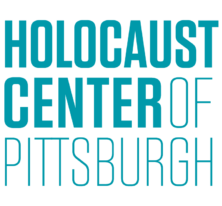
Photo by Brian Cohen
Profile by Jen Fosnaught
Scott Vensel, middle school language teacher for the Fox Chapel School District and ambassador for the Light Education Initiative has been recognized for his allyship and unwavering support of the Jewish community throughout the past 13 years, making him a recipient of the Righteous Among the Neighbors Award.
Vensel’s story didn’t begin with this award, however. His experience with the Jewish faith dates as far back as his college years, on an unexpected foreign trip kickstarting him into the world of advocacy and activism.
As a young college student in 2002, he traveled to Germany and Poland for a month to study the Holocaust.
“That literally was what made me want to become a teacher,” he said. “It just crushed me, and I knew my heart was in the humanities.”
Knowing that the valuable history of the Holocaust couldn’t be ignored, he was determined to bring this education and awareness to others through his teaching.
“As a teacher in this day, you really can’t not mention or educate about these things,” he said.
He believes it’s through education that children learn empathy and allyship.
“It’s a matter of if you plant five seeds, five plants grow, but if you plant 350, well that’s a lot more people who learn,” he said.
His work as a teacher spans different projects, such as art memorials he and his students do to having in-person speakers share first and second person stories.
In 2010 when he began Holocause education, it was easy to find grandparents who had survived the Holocaust, but now few survivors remain. Today, he brings in legacy speakers, who are children of survivors to talk about their parent’s experiences.
“The next wave of all of this, if it’s going to be meaningful, needs to be the children of survivors,” he said. “There is no substitute for personalizing history.”
Whether it be grandchildren in his classes sharing the stories of their grandparents or adults coming in to show personal photographs, these lessons can still be taught through the children of those who lived through the Holocaust.
“These students hear me talk all the time, but when it’s coming from a first or second hand account, it’s a lot more meaningful,” Vensel said.
Outside of his classroom, Vensel has also worked at the Holocaust Center of Pittsburgh introducing speakers who were alive during the Holocaust at the Holocaust Remembrance assembly that he and other colleagues designed.
In 2019, Vensel became an ambassador with the LIGHT (Leadership through Innovation in Genocide and Human rights Teaching) Education Initiative, a program based in Pittsburgh that aims to connect students K-12 with stories and experiences inspiring human connection, empathy and humanity.
The shooting at the three Pittsburgh synagogues who were meeting at The Tree of Life in Squirrel Hill highlights the importance of Vensel’s work, and while his curriculum doesn’t specifically focus on the synagogue shooting, he believes it is not something that should or can be avoided.
“We talk about it as a way of saying history doesn’t repeat itself, but it often rhymes,” he said.
At first, it was a struggle for him to teach about the Pittsburgh shooting. He recalls walking into work after the shooting and thinking “how do we do this?” There were people from his school district in Fox Chapel involved in helping during the aftermath of the shooting, and the school’s nurse was even friends with one of the victims of the tragedy, making it personal and close to home.
Vensel uses the event to teach about the effects of antisemitism, though he says his work focuses more on education than directly addressing antisemitism. It’s usually through his education that lessons of antisemitism are addressed.
“When one learns about the Holocaust and when one teaches about the Holocaust, it’s hard to not talk about hate and prejudice,” even when not specifically not talking about antisemitism.
“In our school districts we’re asked to be in the middle, and I don’t think it’s my responsibility in a public education setting to tell students how to think,” Vensel said. “But when [they] see antisemitism, when [they] see racism, [and] when [they] see sexism, the kids are going to make the connections and learn to be accepting.”
Vensel’s teachings have not only educated his own students but also countless listeners in the LIGHT Program and within the Holocaust Center of Pittsburgh. It’s through these experiences that he has created a positive community and environment for allyship and acceptance in Pittsburgh.
“It’s interesting being an ally because it’s not my story,” Vensel said. “But I need to try to let others with a story share theirs.”
Ultimately, though, he recognizes that, “I don’t have to be Jewish to talk about hate.”
